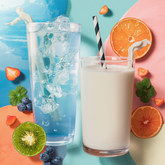On World Plant Milk Day, a global celebration, people unite to raise awareness about the myriad benefits of choosing plant-based milk alternatives over traditional dairy. While there are various reasons to make the switch, the staggering amount of water saved annually is a compelling factor. The Humane Society, an organization dedicated to animal welfare, underscores the environmental advantages of opting for plant milk and shares data that highlights the substantial water savings achievable. In this blog, we will explore how choosing plant milk can make a significant impact on water conservation, as well as the broader benefits of this eco-friendly choice.
- The Rise of Plant Milk
World Plant Milk Day (WPMD), an initiative conceived by Robbie Lockie, co-founder of Plant Based News, has gained momentum as an opportunity for individuals to reconsider their dietary choices. With a multitude of plant-based milk options available today, making the switch from traditional dairy to plant milk has never been easier.

- Water Savings by the Numbers
The Humane Society's research reveals the profound water savings associated with choosing plant milk over cow's milk. For example, an average person who consumes 82 liters of cow's milk annually can save a staggering 328 baths' worth of water by switching to a soy milk alternative. This statistic is a powerful testament to the significant impact of individual choices on water conservation efforts.
- Environmental Impact
The water-saving benefits of plant milk extend beyond personal choices. Plant-based milks, such as almond, soy, oat, and coconut milk, require considerably less water for production compared to cow's milk. This reduction in water usage is not only environmentally friendly but also essential in the context of climate change. Claire Bass, Director of Humane Society International UK, emphasizes the eco-friendliness of plant-based milk, explaining that these alternatives produce far fewer greenhouse gas emissions than cow's milk. Thus, transitioning to plant-based products is a proactive step in combating climate change.

- Animal Welfare
In addition to the environmental benefits, choosing plant milk also aligns with ethical considerations. Many consumers are opting for plant-based options to take a stand against the exploitation and suffering of cows in the dairy industry. By supporting plant milk, consumers are indirectly contributing to the welfare of animals.
- Access and Availability
Plant-based milk alternatives have become increasingly accessible and widely available. Consumers can now find a diverse range of dairy-alternatives in reputable supermarkets. This accessibility makes it easier for conscious consumers to make the switch to plant milk, not just for their own benefit but also to contribute to broader environmental and ethical causes.
The Humane Society's data underscores the profound impact of choosing plant milk on water conservation, reducing carbon footprints, and supporting animal welfare. With the growing availability of plant-based milk options, it's easier than ever to join this eco-friendly movement.
If you're considering a zero-waste, plant-based diet and prefer making your own plant milk at home, try the Milky Plant Machine. It produces plant-based milk in just 3 minutes at the touch of a button—mess-free and with full control over the ingredients. Let's make a difference for ourselves and our planet.















